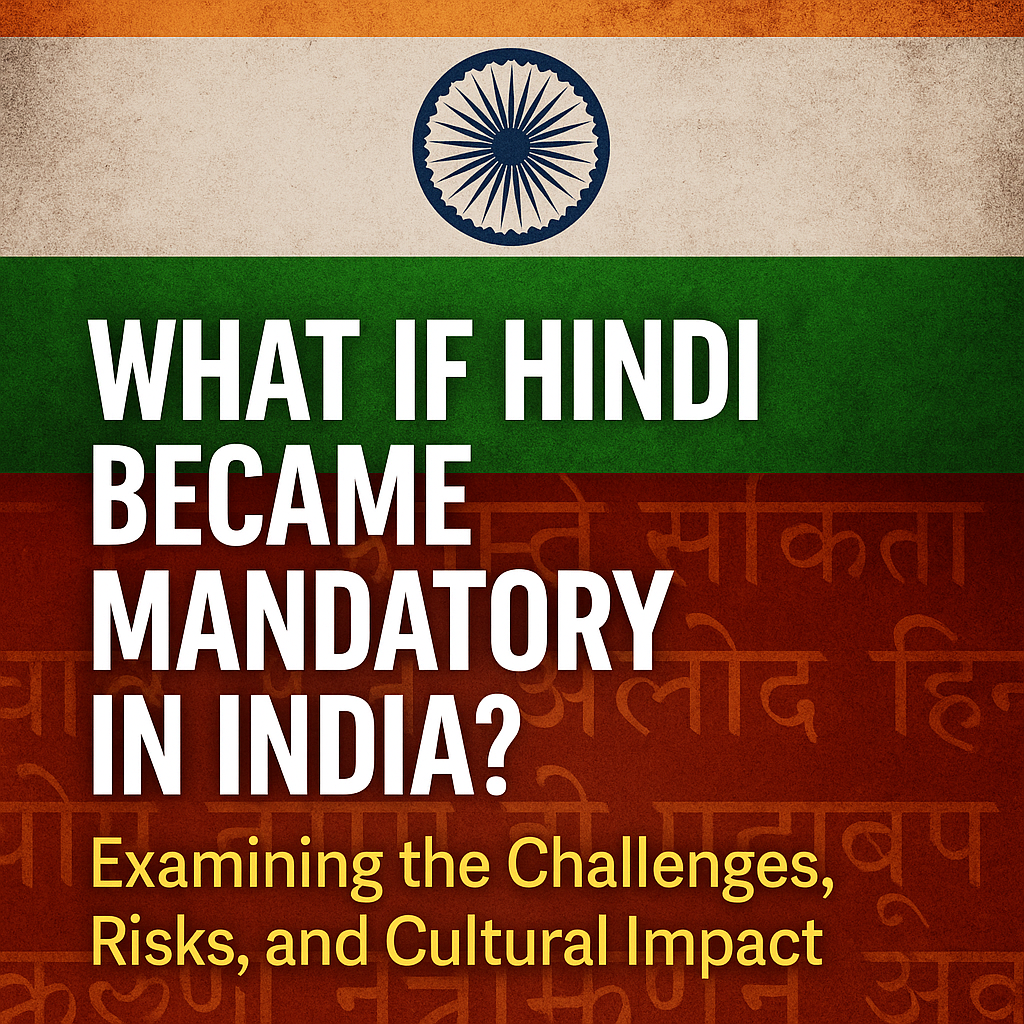
On many occasions, leaders in India have stressed the importance of promoting Hindi as a national language. Recently, Home Minister Amit Shah made a bold statement suggesting that one day, English-speaking Indians would feel ashamed for not knowing Hindi. While this comment has stirred debate, it also raises a serious question: what if Hindi suddenly became mandatory across India?
India is a diverse country, home to over 1.4 billion people who speak more than 120 major languages and thousands of dialects. Hindi is spoken by around 44 percent of Indians as their first language. However, that still means more than half the country communicates primarily in other languages such as Bengali, Tamil, Telugu, Marathi, Kannada, Malayalam, Punjabi, Gujarati, and many more.
If the government made Hindi mandatory for all official, educational, and digital communication overnight, it would trigger major challenges. The most immediate issue would be resistance from states with strong regional identities. In Tamil Nadu, for instance, anti-Hindi movements date back to the 1930s. People there take great pride in their language and culture, and any attempt to impose Hindi has always met with protest. The same holds true in many southern and northeastern states where Hindi is not widely spoken.
From a practical standpoint, education would be among the first sectors to struggle. Teachers in non-Hindi regions would need retraining, and new textbooks would have to be created. Students, especially those in rural areas, would face difficulties understanding lessons if suddenly shifted from their mother tongue or English to Hindi. Many children could fall behind simply because they lack the language skills to keep up.
The workplace would also be hit hard. In India, most private-sector jobs, especially in technology, business, science, and international trade, require strong English skills. If Hindi became the only accepted language for official work, it could isolate India from the global economy. Today, much of the world uses English as the language of science, coding, aviation, diplomacy, and research. Removing English from the equation could weaken India’s global competitiveness.
The internet, which plays a central role in modern life, is another area dominated by English. Although Hindi content is growing, most technical documents, software interfaces, programming languages, and online courses are still in English. If we suddenly stopped using English, India’s IT industry, one of the world’s largest, could face serious setbacks.
English also plays a vital role in uniting Indians across states. A Tamil speaker from Chennai and a Punjabi speaker from Amritsar may not understand each other's regional languages, but they often communicate through English. In that sense, English serves as a neutral link. If Hindi becomes mandatory, it may be perceived by many as the imposition of one culture over others.
Of course, there is nothing wrong with promoting Hindi or any Indian language. India has a rich cultural and literary legacy, and preserving our languages is important. Encouraging Hindi films, literature, and poetry is a powerful way to celebrate that heritage. But making Hindi mandatory in every sphere of life could harm, rather than help, national unity.
Supporters of the Hindi-first policy argue that having one language can foster a stronger national identity. However, India’s true strength lies in its diversity. Forcing linguistic uniformity may destroy the very foundation that makes India unique. The Constitution of India recognizes 22 official languages and upholds every citizen’s right to learn and use their mother tongue.
Another crucial point is freedom of choice. In a democratic society, people should have the right to speak, study, and work in the language they are most comfortable with. Encouraging the use of Hindi is perfectly acceptable. But making it mandatory, especially at the expense of other Indian languages or English, crosses into cultural domination.
So, what is the best way forward?
Instead of imposing one language on all, India should invest in strengthening every regional and national language. People can be encouraged to learn Hindi, just as they are encouraged to learn English, but it must remain voluntary. At the same time, regional languages should be promoted in schools, workplaces, and public life so that no community feels excluded.
Technology can be a great ally. We now have tools and apps that translate, teach, and connect people across languages. These innovations should be used to build bridges, not barriers. India can be a country where citizens speak Hindi with pride, English with skill, and their mother tongue with love.
Insightful Take
While the idea of uniting the country through a common language may sound appealing in theory, the ground reality is far more complex. Making Hindi mandatory would ignore India’s linguistic diversity and could lead to division rather than unity. The true path forward lies in inclusion, respect for all languages, and preparing our youth for a multilingual, global future.





















